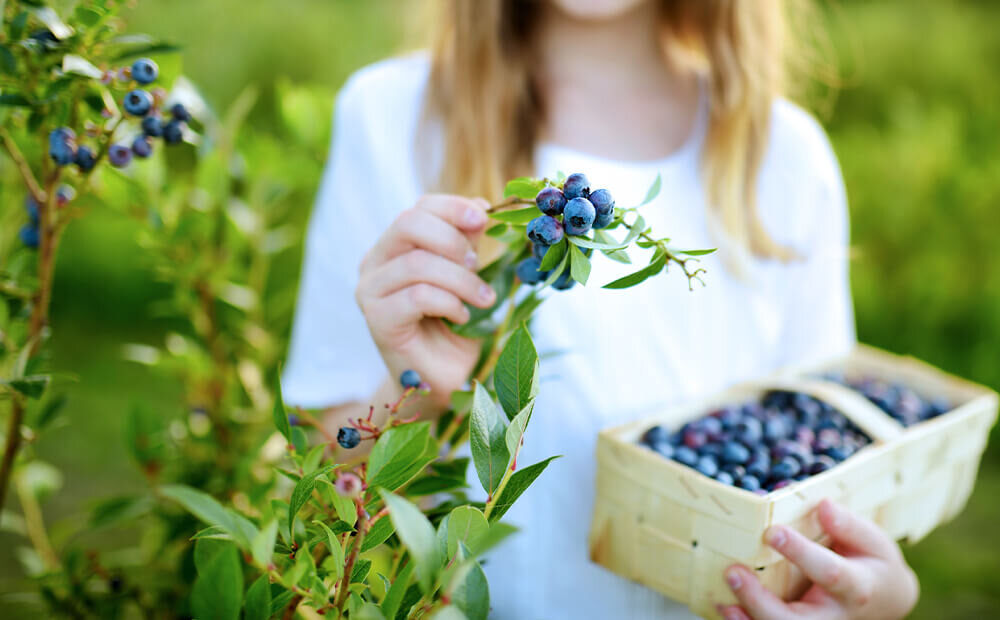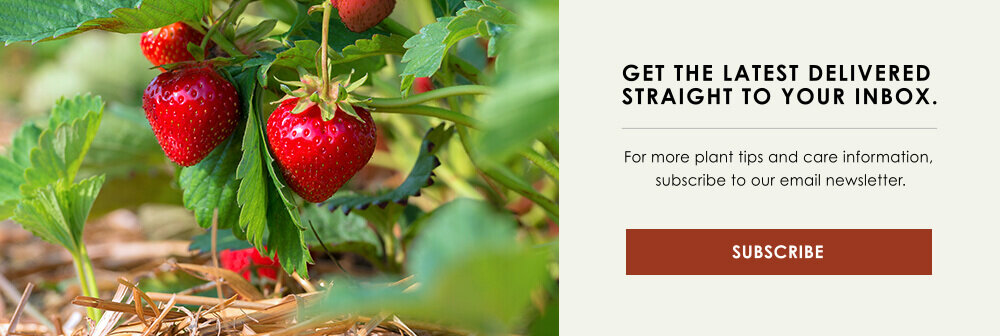GUIDE TO GROWING FRUIT IN INDIANA: FRUITING TREES, SHRUBS, AND PLANTS
With our long and warm summers in Indiana, we’re lucky to be able to grow plenty of fruit in our gardens. All sorts of fruits will grow well across the state, so there’s plenty of options to choose from if you want to start your own fruit garden, whether you have ample space or a tiny yard.
Here’s what you need to know about growing fruit trees, shrubs, and plants in Indiana.
GROWING FRUIT TREES IN INDIANA
When it comes to growing fruit trees in Indiana, you have plenty of choices. We can grow apple, peach, cherry, mulberry, serviceberry, plum, pear, apricot, and even native persimmon trees here in Indiana.
You may want to grow a few different fruit trees in your yard, but make sure you have the right amount of them. Some fruit trees need to have multiples of the same type of tree nearby to produce fruit. Other fruit trees are self-pollinating, so one tree is enough.
Fruit trees will need to be pruned annually to stay productive, healthy, and manageable.
These trees need a minimum of 2 trees growing within 100’ of each other for cross-pollination:
Apple
Cherry
Plum
Pear
Persimmon
These trees can be grown as single specimen trees and will still bear fruit:
Peach
Serviceberry
Apricot
Some mulberry trees are self-pollinating, and others require a male and female tree in proximity. Check the tag at the nursery to be sure.
Many fruit trees are now commonly available as dwarf varieties. Usually, this means the fruit tree has been grafted onto a hardy dwarf rootstock that will keep them to a more manageable size.
PLANTING GRAFTED TREES
When planting grafted fruit trees, identify where the trunk was grafted onto the rootstock and ensure that the graft point stays above the ground when you plant the tree. Plant your fruit trees where they will get at least 6 hours of sunlight during the day, and make sure to water them religiously for the first few years. A layer of mulch over the root area, but not piled up against the trunk, will help to retain soil moisture and keep the root zone at a consistent temperature.
PRUNING FRUIT TREES
Fruit trees will need to be pruned annually to stay productive, healthy, and manageable. Generally, you should prune fruit trees in late winter or early spring while they are dormant. Aim to keep the crown of the tree fairly open in a goblet shape so that air circulates well and light can get into the center of the crown for better fruit production. Most fruit trees can also be trained as an espalier for maximum fruit production in minimal space.
GROWING FRUITING SHRUBS IN INDIANA
Similar to fruit trees, we can grow plenty of fruit-bearing shrubs in Indiana. It’s important to keep in mind with fruiting shrubs that many of them prefer soil with a slightly more acidic pH. If you’re going to be growing multiple types of fruiting shrubs, plan your planting so that shrubs that like acidic soil are all in one area and shrubs that prefer neutral or alkaline soil are in another area.
Fruit shrubs that prefer slightly acidic soil include:
Blueberry
Raspberry
Elderberry
Blackberry
Chokeberry
Gooseberry
Pawpaw
If you already have some of the fruit shrubs above, and you’ve noticed the leaves are growing quite small, and they may be yellowing early, it may be due to the soil. Most of the soil across most of Indiana tends to lean towards alkaline. It’s best to test your soil to find out what the current pH is. You can acidify the soil over time by applying elemental sulfur and using an acidifying fertilizer for your acid-loving plants.
CARING FOR FRUITING SHRUBS
It’s crucial to carefully apply elemental sulfur to avoid dropping the pH too fast, since it can also be harmful to your plants. It can be used before planting and worked into the soil, or it can be applied after shrubs have already been planted.
Fruits that prefer neutral or slightly alkaline soil include:
Blackhaw viburnum
Quince
Many fruiting shrubs also require annual pruning in late winter or early spring as well. The general idea is similar to trees, though shrubs can grow a little denser and still produce fruit. Aim to remove any really old branches, any that rub together, and any that are dead, damaged, or diseased.
All shrubs also benefit from mulch over the root area to retain soil moisture and regulate soil temperature. Similar to trees, though, don’t pile mulch up around the main trunk of shrubs since it can create the perfect environment for rot to set in.
GROWING FRUIT PLANTS IN INDIANA
Strawberries, grapes, melons, and rhubarb are other fruiting plants that also grow well in Indiana. Like other plants, most smaller fruiting plants prefer growing in locations where they get plenty of sunlight.
The main secret to growing fruiting plants that deliver loads of tasty fruit is consistent watering. Rhubarb is a pretty low-maintenance plant, but strawberries, grapes, and melons use a lot of water while producing their fruit, so consistent watering is vital. Growing fruit also requires quite a bit of energy and nutrients, so regular fertilizer is helpful too. Do keep an eye out for the beginning of flower buds on rhubarb, and snip them off as soon as you see them since the flavor of the stalks can become bitter after they flower.
Similar to other plants, most smaller fruit plants will also benefit from mulch. It doesn’t just help regulate soil moisture and temperature; it also keeps the fruit up off the soil. When fruit sits on the soil, it rots really fast, especially with strawberries. To keep your strawberries growing well and producing lots of fruit, pinch off the runners and mulch around the plants. Often the best mulch for strawberries is straw since this keeps the fruit reasonably dry, and it improves the soil as it breaks down.







